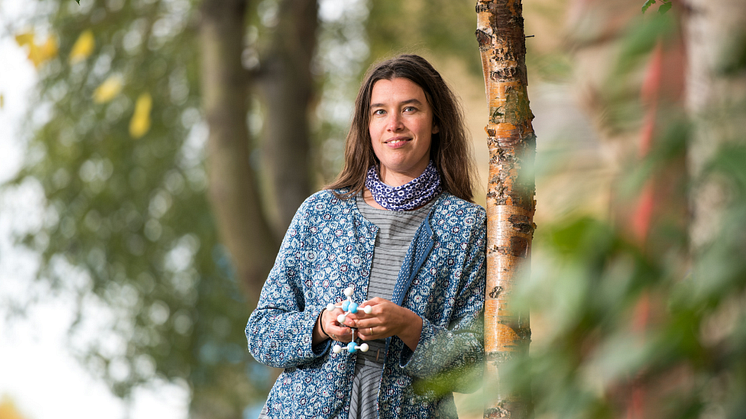
Press release -
Major government funding injection for bioscientists of tomorrow
A new Collaborative Training Partnership (CTP), led by Procter & Gamble and including Northumbria University, has received funding as part of a £22.5m investment from the Biotechnology and Biological Sciences Research Council (BBSRC) to address skill gaps in the UK bioscience industry.
The P&G led Bioscience for Sustainable Consumer Products (BISCOP) CTP will create an inclusive, collaborative environment for high quality doctoral training that will prepare over 30 PhD students – around a third of which will be based at Northumbria - with the knowledge and skills needed for successful careers at the forefront of global bioscience. This will help ensure the UK maintains a leadership position in bioscience with improved translation of frontier research into economic and societal impact.
The BISCOP partnership spans Procter & Gamble Technical Centres Limited, Prozomix Limited, Northumbria University, Newcastle University and Durham University, and will build on long-standing close partnerships in the region to generate more capacity into the bioscience skills base in the North East of England.
Professor of Protein Biochemistry and BISCOP programme lead for Northumbria University, Gary Black, said: “This BBSRC Collaborative Training Partnership will allow Northumbria University, to further develop our long-standing relationship with regional partners Procter & Gamble and Prozomix around enzyme discovery, development, production and characterisation and, importantly, will allow us to initiate new interactions involving probiotics, carbon capture and waste valorisation research, to name just a few.
“The next generation of bioscientists trained through this programme will play a vital role in our action on climate change by helping to create more sustainable consumer products.”
Developing the next generation of sector leaders
The program will leverage the unique partner capabilities to deliver cohort training that will develop future sector leaders with the transferable skills and experiences required for success in the emerging research environment. It will focus on six BBSRC research topics of Industrial Biotechnology, Synthetic Biology, Structural Biology, Microbiology, Technology Development, and non-food aspects of Diet & Health. Many projects will involve interdisciplinary research, collaboration between institutions within and outside the partnership, and international collaboration.
Jerry Porter Senior VP, R&D, Procter & Gamble, said: “We are very excited to secure this BBSRC Collaborative training partnership on Bioscience for Sustainable Consumer Products. We see this as a unique opportunity to train a new generation of bioscientists and grow the skills needed to fuel the UK economy in the future. We look forward to seeing what creative new solutions and ideas this partnership will open up to help address some of the fundamental challenges we face as a company and a society on how to decarbonise industry and deliver on the race to Net Zero.
“This programme builds on strong and long-lasting relationships between P&G, Prozomix, Durham, Northumbria and Newcastle Universities. We expect this partnership to help P&G develop new insights and solutions through collaboration on cutting edge bioscience that will ultimately help accelerate our action on climate change toward net zero greenhouse gas emissions across our operations and supply chain by 2040.”
Sustainable consumer products
The CTP PhD studentships at Northumbria University will focus on developing novel enzyme technology which will ultimately make everyday household cleaning products more environmentally friendly.
An enzyme is a biological substance that speeds up chemical reactions, such as breaking down – or degrading – dirt on clothes or dishes. By studying what the components of dirt on everyday items are and how best to break them down, scientists will look to discover, develop and characterize enzymes that can be produced at large scale. These enzymes will then be tested as ingredients in consumer cleaning products to see whether they perform as well as existing chemical products.
The hope is that these novel enzyme technologies will enable the development of more environmentally friendly cleaning products, that allow us to wash at lower temperatures and for less time, therefore cutting down on heating and water.
In total, there will be 225 studentships as part of the new BBSRC CTPs, in partnership with academia and industry, spanning 29 businesses and 12 academic research organisations. The four-year studentships will be delivered over the period 2022 to 2028 with £22.5 million of funding from BBSRC, and more than £14 million cash and in-kind co-investment from industry partners.
BBSRC executive chair, Professor Melanie Welham said: “With the awards we have announced BBSRC underlines its commitment to work with industry to support the next generation of bioscience researchers. Projects will span areas vital to our strategic priorities, such as tackling infections and helping to meet our net zero goals.”
This programme is a further example of Northumbria University’s commitment to a more sustainable future. Having ranked 50th globally for sustainability earlier this year, Northumbria is recognised as one of the global leaders for sustainability in Times Higher Education’s Impact rankings for the contribution it makes to the United Nations Sustainable Development Goals. The rankings recognise how universities operate and how their research and partnerships are delivering social, environmental, and economic benefits regionally, nationally and internationally.
- Ends -
Notes to editors:
About the Biological Sciences Research Council (BBSRC)
The Biotechnology and Biological Sciences Research Council (BBSRC) invests in world-class bioscience research and training. This research is helping society to meet major challenges, including food security, green energy and healthier, longer lives and underpinning important UK economic sectors, such as farming, food, industrial biotechnology and pharmaceuticals.
About the Collaborative Training Partnership (CTP) Scheme
Collaborative Training Partnerships co-invest in training the next generation of skilled people for the research base and wider bioeconomy.
Our vision is to provide PhD students with a first-rate, challenging research training experience within the context of a mutually beneficial research collaboration, between academic and partner organisations.
Topics
Categories
Northumbria is a research-rich, business-focused, professional university with a global reputation for academic excellence. Find out more about us at www.northumbria.ac.uk --- Please contact our Media and Communications team at media.communications@northumbria.ac.uk with any media enquiries or interview requests ---











